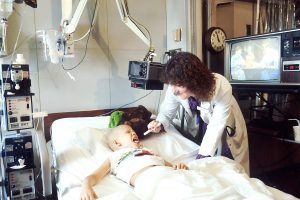Healthcare has changed dramatically over the last few decades. In response to these changes, patient care has undergone a paradigm shift. Nurse practitioners, especially in primary care, fill a large gap in the healthcare system, even though doctors still play a vital role.
There is a distinct difference between the roles of nurse practitioners and doctors. There is a difference in their educational requirements. There is a fundamental difference between their approaches to illness, health, and patient care.
There are many similarities and differences between these two types of healthcare professionals, which we will discuss in this article. You will gain a better understanding of which career and educational path are right for you by carefully analyzing these factors.
What Is a Nurse Practitioner vs. Doctor?
Nurse Practitioner
Registered nurses with advanced practice nursing degrees are called nurse practitioners (NPs). Advanced practice nursing degrees include a Master of Science in Nursing (MSN) and a Doctor of Nursing Practice (DNP).
Nurse practitioners are those who complete one of these two degrees and pass the licensing exam.
There are a variety of nurse practitioner tracks available, with licensing based on patient populations and specializations.
The scope of practice of a nurse practitioner varies from state to state, but they usually possess prescriptive authority and can provide healthcare independently or collaborate with doctors.
Nursing practitioners typically focus on primary care, which is the first point of contact for patients within the healthcare system. They assist patients with their everyday health needs as well as prevent and treat illnesses.
Doctor
An MD (Medical Doctor) and a DO (Doctor of Osteopathic Medicine) are recognized as the two types of medical doctors in the United States. Despite both paths leading to a similar degree, their approach and philosophy differ to some extent.
They continue their education in a specialty after graduating from medical school through an internship and residency. As well as providing primary care, doctors also specialize in several disciplines, including surgery.
As a result of doctors’ extensive training and different approach to medicine, they practice medicine differently than nurse practitioners.
Nurse Practitioners vs. Doctors at a Glance
Similarities
There are several similarities between doctors and nurse practitioners that include the authority and ability to:
- Take a medical history of the patient
- Assess and evaluate symptoms
- Identify and diagnose diseases
- Have prescribing privileges
- Provide diagnostic tests to their patients
- Develop a treatment plan for their patients, follow up on those plans, and refer them to specialists as needed
Differences
There are many differences between nurse practitioners and doctors, but their primary difference is their level of education.
- Degree: Nurses complete a nursing degree, including clinicals, and then pass a licensing examination to become a registered nurse (RN). The majority of Doctor students complete a science or liberal arts degree in their undergraduate years, which is not nearly as focused as an undergraduate nursing program.
- Further education: NPs earn a Master of Science in Nursing degree, which is usually completed in two to three years. A doctor’s training usually begins after four years in medical school, followed by an internship, residency, and sometimes a fellowship.
- Level of education: A nurse practitioner typically completes a master’s degree, unless they later pursue a doctorate in nursing practice (DNP). The majority of doctors have at least a doctorate degree before they begin their careers.
- Practice and duties: Nursing philosophy relies heavily on preventive and holistic treatment, which is at the core of nurse practitioners’ practice. It is also crucial to be an advocate for patients and to provide patient-centered care as part of a nurse practitioner’s role.
- Even though doctors value their patients equally, they are often more technical in their diagnosis and treatment, as they examine patients from both a clinical and scientific perspective.
Nurse Practitioners vs. Doctors: A Comprehensive Comparison
Nurse Practitioner vs. Doctor: What They Do
The specialty area or population that nurse practitioners specialize in can be influenced by advanced education, which allows them to take the general knowledge of registered nurses and specialize in it. Primary care, disease prevention, holistic health, and patient advocacy are often the primary focuses of nurse practitioners.
Routine responsibilities include reviewing patients’ medical histories, ordering lab tests, diagnosing, and prescribing medications to the population of patients they serve.
The duties of doctors go beyond those of nurse practitioners, including diagnosing and treating diseases. Although some doctors specialize in primary care, many others are trained to diagnose and formulate complex treatment plans requiring specialized expertise.
There are some basic procedures that nurse practitioners can perform. Surgeons, however, must undergo additional, rigorous training after completing medical school.
Among the biggest differences between doctors and nurse practitioners are:
- Experience
- Expertise
Nurse Practitioner vs. Doctor: Specialization Options
There are a variety of specializations available to both nurse practitioners and doctors. Nursing practitioners, however, typically specialize in primary care or take on general hospitalist roles in acute care hospitals. Their training is still usually limited to three to four years upon completion of their undergraduate nursing degree, despite specialization.
Doctors typically undergo seven to eleven years of intensive training and education when they specialize. Additionally, they specialize in more specific areas than nurse practitioners.
Nurse Practitioner vs. Doctor: Requirements For Education
Nurse practitioners are advanced practice nurses who provide a higher level of patient care than registered nurses. In order to obtain their registered nurse license, nurses must obtain a bachelor’s degree in nursing (BSN) and pass the National Council Licensure Examination (NCLEX).
Upon completing their undergraduate degree, they must obtain a graduate degree in nursing – either an MSN or DNP, which will prepare them to take the licensing exams for nurse practitioners.
Doctors must complete a four-year undergraduate degree before entering medical school. Also, they need to take any prerequisite courses that weren’t covered in their degree, and they need to pass the Medical College Admission Test (MCAT), the entrance exam for medical school.
Medical school, an internship, and a residency program are the next steps. Fellowship programs are available for doctors who wish to continue their education. A fellowship allows them to delve even deeper into a particular field.
Nurse Practitioner vs. Doctor: Time Investment
Nurse practitioners can earn their degrees in a variety of ways, including traditional programs and accelerated programs. A registered nurse’s method of obtaining their license is also an important consideration. It usually takes six to seven years to complete this education process.
A Bachelor of Science in Nursing (BSN) degree will be earned after four years of undergraduate study, and a Master of Science in Nursing (MSN) degree will be earned after two years. An accelerated program can speed up this process, or studying part-time instead of full-time can slow it down.
Those states that require a DNP for nurse practitioner licenses require an additional three to four years of schooling, making the total education commitment ten to eleven years.
A doctor’s educational commitment is substantial and can easily last a decade or more. A four-year undergraduate degree is followed by four years of medical school, followed by a one-year internship. In order to practice medicine, a doctor must complete a residency.
This program can last between three and seven years, depending on what specialty they are pursuing. In the end, becoming a doctor requires at least twelve to sixteen years of education and training.
Nurse Practitioner vs. Doctor: Education Cost Investment
Master’s degrees in nursing and nurse practitioner licensure can vary in cost depending on several factors. A key factor in the varying costs is the college or university one attends and the nursing program one chooses. The most affordable education is generally found in in-state public schools.
It can cost thousands of dollars more to earn the same degree at a private or religious school. An undergraduate degree, a master’s degree, and possibly a doctoral degree are all required for nurse practitioners.
At the lower end of the scale, nurse practitioner education can cost anywhere from $20,000 to $60,000; at the higher end, it can cost well over $100,000.
As well as undergraduate and medical school tuition, a multitude of ancillary fees are involved in becoming a doctor. Tuition varies based on the quality of the program, and whether or not students are state residents. It is common for doctors to have total education costs that range from close to $200,000 to well over $500,000.
Nurse Practitioner vs. Doctor: Coursework Requirements
Generalized nursing courses are offered in nursing programs at the undergraduate level. A few examples of these courses include pathophysiology, pharmacology, adult care, and pediatric care.
In addition, classes are offered on ethics, leadership, and morals. With a master’s degree, students can specialize, and while core courses will be taken, the majority of courses will focus on serving the population they seek to serve. The doctorate level allows for even greater specialization.
There are a variety of undergraduate degrees available to pre-med students. Medical school programs, however, tend to be very similar from one school to another. It is typical for medical school to include both didactic and laboratory learning during the first two years.
Students typically take anatomy, biology, pharmacology, and patient assessment classes. Students rotate through specialty departments in hospitals during the third and fourth years of medical school. Upon graduation from medical school, students will begin residency training in their chosen fields.
In most residency programs, the focus is less on coursework and more on learning from more experienced doctors.
Nurse Practitioner vs. Doctor: Hours of Clinical Practice
In order for a nurse practitioner to sit for the state’s licensing exam, they must have completed at least five hundred direct and supervised patient care hours.
It is possible for students to split up their hours in different ways and across different populations in order to accomplish the competencies emphasized by the specific program track.
Additionally, some students may participate in simulation training or additional clinical hours beyond the minimum requirement.
One of the things that sets doctors apart from nurse practitioners during school is their clinical experience. As part of their medical school training, students rotate through hospitals and outpatient clinics for two full years.
They will gain more clinical experience during their residency over the next three to seven years. Prior to practicing independently, doctors have logged thousands of hours during their clinical training.
Nurse Practitioner vs. Doctor: Certification and Licensing Requirements
In order to become a nurse practitioner, one must first hold a bachelor’s degree in nursing and an unencumbered license as a registered nurse. Then, they must pursue a Master of Science in Nursing degree and pass the nurse practitioner board examinations within their specialization track before they can become nurse practitioners.
In addition, there are post-graduate programs. Nursing specializations and certifications enable nurse practitioners to gain expertise in specific fields. Individual states issue licenses for nurse practitioners, while specialized credentialing bodies issue certifications.
As part of medical school, doctors must take USMLEs, or medical board exams. Students take these exams over a number of years, including after they graduate from medical school and earn their doctorate. USMLE will be taken by students in the following sequence:
- Step 1:
- Upon completion of the second year of medical school
- Health sciences, nutrition, aging, and basic health sciences are tested
- Step 2:
- Typically occurs during the fourth year of medical school
- This test assesses both clinical skills and knowledge
- Step 3:
- One year after residency
- Identifies whether a student is ready to practice independently as a doctor
It is common for doctors to become board certified within the field of medicine they specialize in. A certificate of competency in that field of medicine demonstrates expertise and proficiency.
Nurse Practitioner vs. Doctor: The Scope of Practice
State laws governing doctors’ and nurse practitioners’ scopes of practice differ greatly and are changing as nurse practitioners’ role in filling enormous healthcare gaps becomes more apparent.
The regulatory frameworks for nurse practitioners vary from state to state, with some allowing them to practice autonomously and with broad prescribing authority and others restricting them in some ways. A nurse practitioner is accountable to their respective state boards and must adhere to nursing standards.
Nursing practitioners diagnose and treat illnesses, provide counseling and education, consult, conduct research, and advocate for patients. There are a variety of healthcare settings where these services can be provided.
However, nurse practitioners are primarily concerned with meeting the needs of the patients, families, or populations they serve.
As opposed to nurse practitioners and physician assistants, doctors do not have a defined scope of practice. The practice of medicine is instead governed by state medical laws.
Hospitals, medical organizations, specialties, and state and federal laws define the duties and privileges of doctors, not a scope. All tasks that fall under the umbrella of medicine are generally allowed to be performed by doctors.
Nurse Practitioner vs. Doctor: Where They Work
Nurse practitioners work in a wide variety of settings. A wide range of needs are met by these settings, from hospitals to outpatient clinics to schools and corporations.
They are highly valued in almost all areas of health care where patient-centered care is a priority since nurse practitioners work in collaborative teams.
It is also common for doctors to practice in a variety of settings. Some work in private practices and doctor’s offices, while others work in hospitals as generalists. Doctors often visit both clinics and hospitals to see patients and spend time with them in both settings.
Some doctors prioritize clinical research over patient care. Furthermore, doctors can also work in government or in healthcare administration roles.
Nurse Practitioner vs. Doctor: Career Prospects
Although nurse practitioners have varying job prospects by location, there is still a very good job outlook overall. Nurse practitioners fill a significant gap in healthcare and are in high demand due to their shorter training requirements.
There are fewer people going to medical school now because of its high cost and substantial time commitment. Medical care needs are increasing as a result of longer lifespans and advances in medicine. In addition, older doctors are retiring or nearing retirement, creating a demand for these positions to be filled.
Choosing the Right Career Path
In comparing nurse practitioner and doctor careers, you must consider a variety of factors, such as educational costs, career prospects, and goals for your professional and personal life.
Doctors and nurse practitioners have rewarding careers, and their roles go beyond direct patient care. As a result of their expertise and knowledge, they excel in a wide variety of roles and settings.
In order to become either one or the other, you will have to consider which aspects of healthcare are most important to you, as well as the amount of time, energy, and money you are willing to invest.
Written by Joanne Potter
Joanne, BSN and RN, is a writer that specializes in health and wellness. She has fifteen years of experience as a Registered Nurse in the NICU (Neonatal Intensive Care Unit). Her years working at the bedside and extensive neonatal knowledge enable her to write with a deep understanding of what patients and families want from their communities. Visit her LinkedIn page.
















